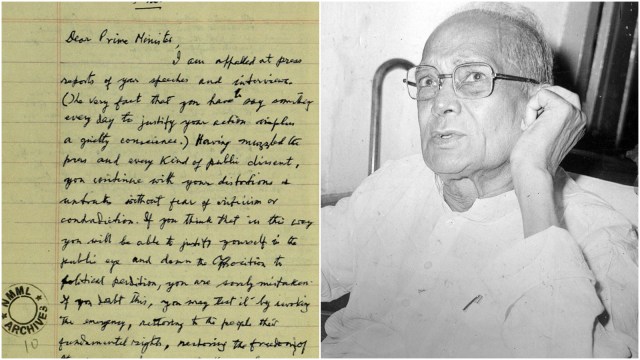
A characteristically sharp attack that accused Indira Gandhi of resorting to “fascism”, a defence of his own position, and a personal appeal to her as the friend of her father Jawaharlal Nehru to not destroy democracy — Jayaprakash Narayan swung between anger and emotion in a letter he wrote to Mrs Gandhi on July 21, 1975, from the solitary confinement where he was kept by her government.
The letter is preserved in JP’s original handwriting as part of his jail diaries at the Prime Ministers’ Museum and Library archives in the capital.
“You know I am an old man. My life’s work is done. And after Prabha’s (his late wife) going, I have nothing and no one to live for… I have given all my life to the country and asked for nothing in return. So, I shall be content to die a prisoner under your regime,” JP wrote.
His “parting words of advice”, he said, were: “Please do not destroy the foundations that the father of the nation, including your noble father, had laid down. There is nothing but strife and suffering along the path that you have taken.”
The damage inflicted would take a long time to repair, JP wrote, though he was confident that India would spring back. “A people who fought British imperialism and humbled it cannot accept indefinitely the indignity and shame of totalitarianism… Indira ji, please do not identify yourself with the nation. You are not immortal, India is.”
Hitting out at the PM for muzzling the press and for imprisoning Opposition leaders, JP dismissed her purported statement that “democracy is not more important than the nation”. “Are you not presuming too much, Madam Prime Minister? You are not the only one who cares for the nation. Among those you have detained or imprisoned, there are many who have done much more for the nation than you,” the veteran freedom fighter, who had led the Quit India Movement of 1942 underground after the arrest of the top leadership of the Indian National Congress, wrote. “And every one of these is as good a patriot as you. So, please do not apply salt to our wounds by lecturing to us about the nation.”
He added, “There is no choice between democracy and the nation. It was for the good of the nation that the people of India declared in the Constituent Assembly on 26th November, 1949, that ‘We the people of India having solemnly resolved to constitute India into a sovereign democratic republic… give to ourselves this Constitution.’ That democratic Constitution cannot be changed into an authoritarian one by a mere ordinance or a law of Parliament.”
Read the full letter below:
JP also accused Indira of spreading canards to justify her decision and painting him as the villain of the piece. “Having muzzled the press and every kind of public dissent, you continue with your distortions and untruths without fear of criticism or contradiction. If you think that… you will be able to justify yourself in the public eye and damn the Opposition to political perdition, you are sorely mistaken,” he wrote, challenging her to revoke the Emergency if she doubted his words and hold elections.
On his appeal to the police and Army to not take “unlawful orders”, JP denied the charge that it was an attempt to paralyse the government. What was being done was non-violent civil disobedience, he said, as people had the right to protest non-violently rather than wait for the next elections if they saw large-scale corruption and misgovernance.
The socialist leader said people also had the right to demand the resignation of an elected government in the event of misrule, and said the mammoth anti-government rallies being held were proof of the popular sentiment. In the case of Bihar, JP said, the instances of firing and lathicharge on students had made matters worse.
JP added that all he had tried to do was “to make the men and officers of the forces conscious of their duties and responsibilities”, and that this was “within the law: the constitution, the Army Act and the Police Act”.
JP mentioned that the evening before the Emergency was clamped, Nanaji Deshmukh had announced at the Ramlila Maidan rally in Delhi a Satyagraha pending the Supreme Court ruling on the Allahabad High Court verdict that had struck down Mrs Gandhi’s election to the Lok Sabha.
Instead of responding to the popular demand to step down after the verdict, JP regretted, Mrs Gandhi had tried to cling to power. “Through your henchmen, you had rallies and demonstrations organised in front of your residence begging you not to resign.” He also mentioned a smear campaign against the High Court judge who pronounced the verdict against her.
Attacking the sycophancy in the Congress, with the exception of leaders like Chandra Shekhar and Mohan Dharia who had been jailed, JP said Mrs Gandhi would not be able to fool the people of India despite all her efforts. “… a party of self-seekers and spineless opportunists and jee-huzoors such as the Congress, alas, has become, can never do anything worthwhile,” he asserted.